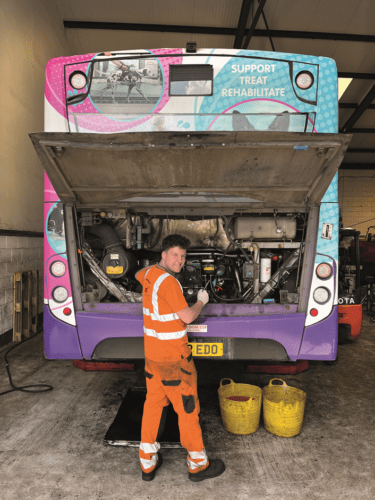
Adrian Morton speaks to Paul Clark, founder of mobile maintenance provider Paul Clark Services, about the growth and expansion of the business
After a relaxing early May Bank Holiday Monday, I set off early the following day from my Cheshire home; the destination, Royal Wootton Bassett. My objective, to meet Paul Clark and his team from industry engineering support specialists Paul Clark Services.
The town of Royal Wootton Bassett has always had close links with the nearby Royal Air Force base at Lyneham. In 2001 it was granted the ‘Royal’ prefix in recognition of the role the town and its people have played in the repatriation of UK service men and women killed as a result of war.
Established in 1997 by Managing Director Paul Clark, fellow Director Michael Kerslake was persuaded to join him 18 months later as Paul could no longer single handedly cope with the volume of work he was receiving. Their long-term relationship had begun some years prior at Athelstan Coaches in Malmesbury, where they both served four-year apprenticeships. Towards the end of their apprenticeships, Athelstan Coaches changed ownership and became Overland & County.
After gaining his qualification Paul decided to leave and join the nearby municipal operator in Swindon, Thamesdown Transport. Here he became its youngest skilled mechanic at just 21 years of age. Michael followed Paul to Thamesdown Transport two years later and their strong working relationship continued to flourish. It didn’t take long for Paul to become Assistant Engineering Manager, and when he did he his asked Michael to become his Day Shift Supervisor.
Brave decision
In 1996 with the opportunity for promotion likely to be some years away and still by this time only 30 years of age Paul decided to have a go at going it alone as a self-employed mobile engineer to the bus and coach sector. His first job was a Gardner engine change in a former London Transport Leyland Titan for Dick Bennett of Bennetts Coaches of Newbury. Coincidently, growing up near Newbury and my father working in the town, I had always admired the smart fleet of Bennetts. In later years I got to know Dick and his wife Mary well. Paul completed the task in just two days, earning what it would have taken him a week to achieve at Thamesdown.
[…]By subscribing you will benefit from:
- Operator & Supplier Profiles
- Face-to-Face Interviews
- Lastest News
- Test Drives and Reviews
- Legal Updates
- Route Focus
- Industry Insider Opinions
- Passenger Perspective
- Vehicle Launches
- and much more!


